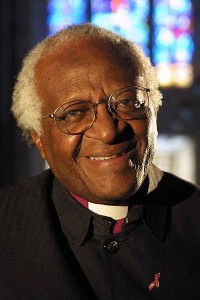The government and human rights
In the past few months I have had several excellent conversations about the origin and inventory of human rights. It seems most people agree with the idea that people are “endowed by their Creator with certain unalienable rights,” yet when it comes to specifics there is much disagreement. For instance… does “Life, liberty and the pursuit of happiness” refer to freedom or opportunity (put another way, are these things something all people should have, or have the option of having — the difference is substantial).
This discussion began when I compared universal education with universal health care and asked if both should be considered human rights. My friend Aaron pushed back saying that rights exist individually apart from anyone granting them to you. (Therefore if the government is the purveyor of universal health care, it cannot exist beyond them and thus cannot be a right). Desmond Tutu takes a different approach by saying human rights exist because we are created in the image of God. Without too many specifics, he argues this means we should extend respect and care to all people.
As nice as it is to say that rights are inherent and/or God-given, it seems the facts of history do not support this. Most would agree the freedom (from slavery) is a God-given right. However, in the hundreds of years across which the Bible was written, this “right” was never extended or even articulated. Heck, even our constitution, which is still a relatively recent document, did not consider this to be a right.
At the end of the day, societies are the ones who give rights, and this usually comes in the form of the government. Put another way, rights can not be rights until they are extended by the authority of a group of people (government). Freedom of speech, which is actually a relatively old idea, was first extended under Greek empire. Before the powers that be articulated and defended that right, it did not exist. Likewise, freedom from ownership was not a right to be extended until governments listened to the Abolitionists and began protecting people from slavery.
Rights may in fact come from God, but at the end of the day, it is up to governments (or other authoritative communities) to identify and codify these rights. One thing is clear… Rights are not static, but are evolving. In the last 250 years, Americans have come to generally agree on a slew of individual rights: right to bear arms, right to vote, right to practice religion, right to private property, right to a fair trial, etc. While people may consider these to be God-given, they are all actually given by our constitution.
It is my belief that we as a society are moving towards a more civilized existence. I am glad our constitution protects so many rights and I am also glad our nation has risen up to extend more rights (like voting and abolishing slavery). I believe we have reached the point where we understand what things should not be done to people and are starting to understand what things should. It is my guess that in 100 years, everyone will consider education, healthcare, clean drinking water, adequate food and shelter to be basic human rights that should be extended to all. We should not fear the government extending these rights anymore than we should have feared the government banning slavery. Change happens, and when it comes to governments extending rights, history has consistently shown this to be a good thing.
